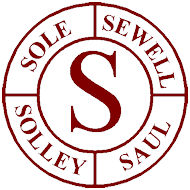By Tony Storey
This article was published in the August 2023 edition of Soul Search, the Journal of The Sole Society
When researching the article about the de Saulles family, I guessed that I was probably dealing with a locative surname and set off in search of a place with a similar name. Sure enough, I found a small town not too far from Samuel’s birthplace in Switzerland, albeit with the slightly different spelling of Saules. The area, like Neuchatel, is French-speaking and it seems likely that the de Saulles family came originally from Saules. I regarded it as a good omen when I read that the inhabitants pronounce the name of their home town as ‘SOL’.
Frederick de Saulles came to London in about 1800 and was clearly an educated man. He would have been able to spell and write his name. But imagine if a century or so earlier a less literate member of the same family had arrived at our border and been asked his name? His reply would have sounded like Sole, Soule, Soal, Sowel… Somewhere today there may be someone who has hit a brick wall tracing his family history. It must seem as if his earliest known ancestor just appeared out of nowhere!
I firmly believe that ‘sound-alikes’ or homophones should be considered a possibility in any one-name study like ours, just as we consider possible errors in transcriptions. I recently watched an edition of Who Do You Think You Are. It was revealed that Sir Paul McCartney’s paternal grandfather was actually a McCarthy, but the name was misread or misheard!
It is said that about ten per cent of our conscripts in the First World War were unable to read or write their name. It sounds improbable and may well be an exaggeration, but what is certainly true is that most of us today take literacy for granted. We may sometimes forget that some of our ancestors were reliant on an official or perhaps a cleric to write their name for them. How many times have we seen an X for a signature on a marriage certificate? As we go back in time an error in transcription becomes more likely. There are plenty of mistakes in old records, sometimes due to carelessness, but often because a name was misread or misheard. In the last two centuries it has become more important to spell a name correctly, but it wasn’t always so. Some of our more distant antecedents were clearly not bothered at all.
So we should never dismiss a possible solution to a long-standing mystery because of a slight difference in spelling, and we should always bear in mind the homophone.
We need to ask ourselves the question – faced with a mumbling immigrant or a pair of giddy newly-weds, what might an overworked border guard or an impatient vicar write in his register?
